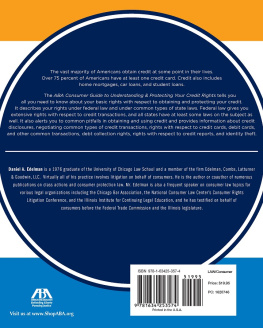
Cover design by Tony Nuccio/ABA Design
The materials contained herein represent the opinions of the authors and/or the editors, and should not be construed to be the views or opinions of the law firms or companies with whom such persons are in partnership with, associated with, or employed by, nor of the American Bar unless adopted pursuant to the bylaws of the Association.
Nothing contained in this book is to be considered as the rendering of legal advice for specific cases, and readers are responsible for obtaining such advice from their own legal counsel. This book is intended for educational and informational purposes only.
2017 American Bar Association. All rights reserved.
No part of this publication may be reproduced, stored in a retrieval system, or transmitted in any form or by any means, electronic, mechanical, photocopying, recording, or otherwise, without the prior written permission of the publisher. For permission contact the ABA Copyrights & Contracts Department, .
21 20 19 18 17 5 4 3 2 1
e-ISBN: 978-1-63425-358-1
Library of Congress Cataloging-in-Publication Data
Names: Edelman, Daniel A., author.
Title: ABA consumer guide to understanding & protecting your credit rights A practical resource for maintaining good credit / Daniel Edelman.
Other titles: Borrower and credit rights | American Bar Association consumer guide to borrower and credit rights
Description: Chicago, Illinois : American Bar Association, 2017.
Identifiers: LCCN 2017019660 | ISBN 9781634253574
Subjects: LCSH: Consumer creditLaw and legislationUnited States. |
Credit cardsLaw and legislationUnited States. | Debit cardsLaw and legislationUnited States. | CreditLaw and legislationUnited States. | Debtor and creditorUnited States. | Consumer protectionLaw and legislationUnited States.
Classification: LCC KF1040 .E34 2017 | DDC 346.7307/3dc23 LC record available at
https://lccn.loc.gov/2017019660
Discounts are available for books ordered in bulk. Special consideration is given to state bars, CLE programs, and other bar-related organizations. Inquire at Book Publishing, ABA Publishing, American Bar Association, 321 N. Clark Street, Chicago, Illinois 60654-7598.
www.shopABA.org

The vast majority of Americans obtain credit at some point in their lives. Over 75 percent of Americans have at least one credit card. Credit also includes home mortgages, car loans, and student loans.
This book tells you about your basic rights with respect to obtaining and protecting your credit. It describes your rights under federal law and under common types of state laws. Federal law gives you extensive rights with respect to credit transactions, and all states have at least some laws on the subject as well. It also alerts you to common pitfalls in obtaining and using credit. It provides information about credit disclosures; negotiating common types of credit transactions; rights with respect to credit cards, debit cards, and other common transactions; debt-collection rights; rights with respect to credit reports; and identity theft.
Federal law and many state laws give you basic rights in applying for credit. These include the following:
You have the right to shop for the best loan available to you and compare the charges of different lenders.
You have the right to be informed about the total cost of your loan, including the interest rate and other fees.
You have the right to have a clear understanding of the terms and total cost of credit. Disclosures setting forth the key credit terms must be provided to you in a form you can keep before you are bound to a credit transaction.
You have the right not to be discriminated against in connection with a credit transactioneither refused credit or charged more for creditbased on race, color, religion, national origin, gender, marital status, or age; because your income derives from any public assistance program; or because you have exercised in good faith your rights under any title of the federal Consumer Credit Protection Act. The Consumer Credit Protection Act includes the Truth in Lending Act, Consumer Leasing Act, Fair Credit Reporting Act, Equal Credit Opportunity Act, Fair Debt Collection Practices Act, and Credit Repair Organizations Act.
You have the right to have your performance on credit obligations reported accurately by credit bureaus if it is reported at all. Contrary to popular belief, there is no legal requirement that creditors report to credit bureaus unless they promise you to do so in a contract.
You have the right to be informed if the information in your credit file has been used against you, to either deny credit or insurance or increase the cost of credit or insurance. This is done by means of what is generally called an adverse-action notice.
You have the right to know what is in your credit file and to receive a free credit report from each consumer-reporting agency (credit bureau) once per year.
You have the right to ask for your credit score.
You have the right to dispute incomplete, inaccurate, or obsolete information in your credit file.
You have the right to have your credit file used only for specified permissible purposes, such as to review or collect an account or to evaluate a request for credit. (Although the written permission of the subject of the report is a permissible purpose, it iscontrary to popular beliefnot necessary to obtain written permission if another permissible purpose exists, such as a request for credit.)
You have the right not to be subject to deceptive marketing, servicing, and collection tactics regarding credit.
Several important warnings about applying for credit are also appropriate at the outset. First, under no circumstances should a consumer pay money in advance for arranging a loan, other than a modest application fee and fees for credit reports or appraisals for a mortgage or business loan. We have seen consumers charged $1,000 and more for application fees and assistance in applying for credit. They generally get nothing for their money. Advance-fee schemes are generally illegal scams.
Second, under no circumstances should a consumer ever agree to provide false information or documents in connection with an application for credit. Doing so has serious criminal and civil consequences. It is generally a crime to submit false information to a financial institution. The resulting extension of credit may be nondischargeable in bankruptcy.
CAUTION
Never provide incorrect information on a credit application.
CAUTION
Oral promises from creditors are worth the paper they are written on.
Third, review carefully any loan or other credit documentation you receive and make sure that it accurately states the terms of the intended transaction and contains all promises made to you. We hear from many consumers who claim that a lender or car dealer promised them that their rate would be reduced after six months. If it isnt in the documents, it is not enforceable.
Review any credit application you fill out to make sure it is accurate and complete. If any blanks do not apply to you, do not leave them blank; instead, insert N/A or not applicable.
Certain businesses, such as car dealers and mortgage brokers, have been known to insert or alter information on credit applications. If you have any reason to suspect the accuracy of the information supplied to a financial institution through a third party, ask the financial institution for a copy of the information submitted in your name and confirm the request in writing. If it turns out that the copy that the financial institution has is not identical to what you believe you submitted, notify the institution immediately, in writing, of the discrepancy.















